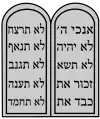| Part of a series on |
| Judaism |
|---|
   |
The Tzoah Rotachat (Hebrew: צוֹאָה רוֹתַחַת, romanized: Ṣōʾā Roṯaḥaṯ, lit. 'boiling excrement') in the Talmud and the Zohar is a location in Gehenna where the souls of Jews who committed certain sins are sent for punishment.
Babylonian Talmud
The Babylonian Talmud lists the cause for a Jew being sent to Tzoah Rotachat as those who scoff at the words of the Chazal are judged in Tzoah Rotachat. The Babylonian Talmud also hints that the punishment has more of a physical implication to it. In Eruvin 21b.10, Rashi writes that he who engages in "excessive scoffing" is met with the second part of the same "straining of the flesh", essentially being judged excessively (straining) of his body.
The supposed presence of Jesus in boiling excrement is one of the often-claimed references to Jesus in the Talmud.[1] Onkelos raises up a spirit named Yeshu by necromancy,[2] and asks him about his punishment in Gehinnom.[3][4] Yeshu replies that he is in "boiling excrement."[5]
According to Gittin, "Onkelos bar Kalonikos, the son of Titus’s sister, wanted to convert." (Babylonian Talmud, Gittin 56b.18)
Onkelos then went and raised Jesus the Nazarene from the grave through necromancy. Onkelos said to him: Who is most important in that world where you are now? Jesus said to him: The Jewish people. Onkelos asked him: Should I then attach myself to them in this world? Jesus said to him: Their welfare you shall seek, their misfortune you shall not seek, for anyone who touches them is regarded as if he were touching the apple of his eye (see Zechariah 2:12). Onkelos said to him: What is the punishment of that man, a euphemism for Jesus himself, in the next world? Jesus said to him: He is punished with boiling excrement. As the Master said: Anyone who mocks the words of the Sages will be sentenced to boiling excrement. And this was his sin, as he mocked the words of the Sages. The Gemara comments: Come and see the difference between the sinners of Israel and the prophets of the nations of the world. As Balaam, who was a prophet, wished Israel harm, whereas Jesus the Nazarene, who was a Jewish sinner, sought their well-being.
— Gittin 57a:3-4[6]
According to Jews for Judaism, the Jesus (Yeshu) in this passage is different from the Jesus of the Christian New Testament; a 1st century BCE Jewish sectarian who rejected rabbinic Judaism by creating a new religion that combined Judaism with Hellenistic paganism.[7] Writing for the Jesuit America magazine, Gilbert S. Rosenthal wrote, "even if Jesus of Nazareth was the intended subject of some of these troubling passages, they reflect the opinion of one man, not the consensus of Jewish thought then or now."[8]
Commentaries
Joseph Karo
Joseph Karo of Toledo (1488–1575), in his Kabbalistic work Maggid Mesharim "Sermonizer on Ethics", explains that just as in the human digestive order the liver, heart and other organs receive their sustaining nutrients from the ingested foods and whatever is of no need and "unworkable" is excreted to give fertility to works of low value (sitra achra "other side"), so too in heavenly judgment this soul is sent to the spiritual level equivalent of excrement and those that derive benefit thereof. As to the concept of "boiling", Joseph relays as to imply during the time of heat and anger of that level (i.e. when the oven is hot), the soul is put there. Karo goes on to compare the heresy of Peor as giving sustenance to this specific level of sitra achra.
Rabbi Yehuda Lowe's explanation
Judah Loew ben Bezalel of Prague (c.1520–1609), in his work Netzach Yisroel ("Eternity of Israel"), provides an in-depth analysis as to this seemingly unconnected sequence of action and punishment. Rabbi Lowe explains, as a rule of thumb, that the logic of Chazal is of an unrelated plane to that of common human intellect. Thus, one who scoffs at it is judged in the opposite of this higher plane, i.e. Tzoah Rotachat, which is considered a matter of irrelation to the relatively superior human body (since it is released as waste) and the antithesis of godly knowledge and presence (as is brought in Talmud Sukka p. 42b that one is obligated to distance himself from the excrement of a child who has the ability of speech since this excrement produces an intense odor comparative to infant who cannot yet speak ). Rabbi Lowe concludes that excrement is the polar opposite of refined godly intellect and worship and is thus the natural consequence of the scoffer thereof and of the Jew who chooses idol worship and Shituf.[9]
Zohar
This defined location is quoted in the Zohar;
There is a place in Gehinom - and levels therein - that are called Tzoah Rotachat. and therein is the filth of souls that are sullied from all filth of this world and (the soul itself) get(s) cleansed and are brought up (but) this filth remains over there. and these evil levels that are called Tzoah Rotachat are in authority of this (leftover) filth. and the fire of gehinnom rules on this filth that is left over, and there are liable individuals that sully themselves with sins on a constant basis and do not undertake to cleanse themselves of them (those sins), and they decease without repentance. and (while alive) they sinned and caused others to sin and they were of a stubborn nature all the while (they were) alive and did not submit before their master in this world. These are judged over there in this filth and in this Tzoah Rotachat that never gets released..on Shabbat and Rosh Chodesh and Yom Tov the fire remains but they are not judged (but, on the other hand) are not released
— Zohar vol. 2 p. 150b
See also
References
- ↑ Peter Schafer Jesus in the Talmud Page 88 - 2009 "The anonymous 'master' alludes to the only parallel from the Bavli which mentions boiling excrement as a punishment"
- ↑ Robert E. Van Voorst Jesus outside the New Testament: an introduction to the ancient ... Page 111 2000 "He replied, "To be in boiling semen." He called up Yeshu by necromancy. He said to him, "Who is honored in the next world? ... (upon being queried as to his spiritual location) He replied, "In boiling excrement." As a teacher has said, "Everyone who mocks the words of the wise is ..."
- ↑ Marvin W. Meyer, Charles Hughes - Jesus then & now: images of Jesus in history and Christology 2001 Page 255 "He answered: "I boil in semen." Onqelos then raised Jesus of Nazareth. He asked him: "Who is important in this world? ... For the master taught, "Whoever scoffs at the word of the sages is punished (in hell) by boiling in feces. "
- ↑ Joseph A Butta Jr, Steven E. Daskal The Jewish People and Jesus: Is It Time for Reconciliation? You Decide Author House 2010 Page 63 "Onkelos then raised the spirit of Jesus who also agreed that Israel was highly esteemed. Onkelos then asked Jesus about his punishment in hell. Jesus answered 'boiled in excrement'. "Anyone who mocks the words of the wise is punished ..."
- ↑ Schalom Ben-Chorin Brother Jesus: the Nazarene through Jewish eyes Page 3. 2001. "'Onkelos asked Jesus, "And what is his punishment?" Jesus said to him, "Boiling excrement." As a baraitha says, "Whoever mocks the words of the wise is punished with boiling excrement. — Come and see how different are Israel's mockers ..."
- ↑ "Gittin 57a:3-4". www.sefaria.org.
- ↑ "Jesus in the Talmud". Jews for Judaism. Retrieved 2023-04-05.
- ↑ "Jewish Views of Other Faiths". America. Retrieved 2023-04-06.
- ↑ Judah Loew ben Bezalel Netzach Yisroel (at 14% into electronic text volume)

